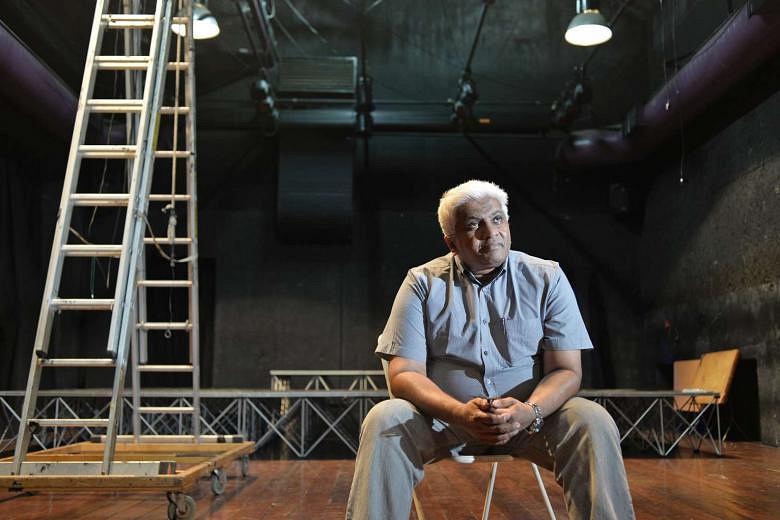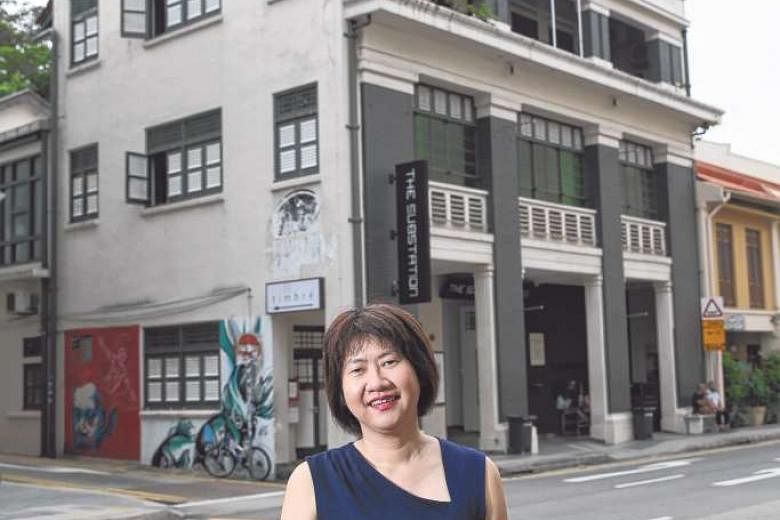It is a small, unassuming building in Armenian Street. Its name is unassuming, too - The Substation. Yet, this former disused power substation has nurtured a remarkable variety of home-grown talent, from playwrights to visual artists.
It blazed a trail in the now-blossoming indie scene as Singapore's first independent arts centre. It remains the only one, too, amid a decline in its fortunes as new arts opportunities spring up elsewhere.
It was launched in the 1990s, at a time when the national conversation was focused on industrial growth and foreign investment. This did not deter a group of plucky and progressive artists, led by the late doyen of Singapore theatre, Kuo Pao Kun, from dreaming of a place where artists of all disciplines and backgrounds could gather to debate, create and showcase art.
Kuo mooted the idea of a home for the arts in 1985. He submitted a proposal to convert the substation into an arts centre, which was approved by the then Ministry of Community Development.

-
ARTS MILESTONES
- • 1969: Setting up of National Book Development Council.
• 1977: Biennial Singapore Festival of Arts launched. Later becomes annual Singapore International Festival of Arts.
• 1978: Singapore Symphony Orchestra formed.
• 1984: Launch of Act 3, the nation's first professional theatre company; specialises in children's theatre.
• 1985: TheatreWorks launched, goes on to become major theatre company. Birth of Lasalle College of the Arts.
• 1987: Start of Singapore Dance Theatre, the nation's first professional dance company.
• 1990: Opening of The Substation, first independent arts centre here.
• 1991: National Arts Council set up to promote arts appreciation. Launch of annual Singapore Literature Prize - first win goes to local author Suchen Christine Lim for Fistful Of Colours.
• 1997: Singapore Chinese Orchestra holds first concert as a professional orchestra.
• 2001: Life! Theatre Awards set up by The Straits Times.
• 2002: $600 million Esplanade: Theatres on the Bay opens in Marina Bay area.
• 2003: Yong Siew Toh Conservatory of Music opens - a partnership between the National University of Singapore and the prestigious Peabody Institute in the United States.
• 2008: School of the Arts, Singapore's first pre-tertiary arts school, officially opens at a temporary campus in Mountbatten. In 2010, it moves to a permanent home in Bras Basah.
• 2015: The National Gallery, which houses the world's largest collection of South-east Asian art, is set to open in November.
Such a place was unheard of in those days, before institutions like the National Arts Council were born, said arts practitioner T. Sasitharan, a former Straits Times arts editor who was The Substation's artistic director from 1996 to 2000.
"It was a prime location as the old National Library was still nearby, and there were many claims to the space. There was a lot of scepticism. People wondered why we needed an interdisciplinary arts centre," he said.
A glance through historical archives reveals the heady excitement, but also the trepidation and uncertainty, that hung over The Substation's opening.
In a February 1990 interview with this paper, Kuo outlined his vision: "I am concerned about creating a space for the arts in our value systems, lifestyle and consciousness. The Substation will be a permanent space to do arts, see arts, talk arts and live the arts."
Yet, just a month later, as he signed the deed of lease, he admitted that the financing was an uphill struggle. Luckily, a donation of $1.1 million from stout maker Guinness the following year kept the fledgling dream afloat.
Recalled Mr Sasitharan: "We were always financially solvent. What was difficult was finding resources to support young artists and new types of works like performance art and installations. But that struggle is always part and parcel of making art."
The Substation is still the only independent arts centre here. Although it gets government funding through grants, it is not government-linked, unlike The Esplanade.
Former Nominated Member of Parliament Audrey Wong was its co-artistic director from 2000 to early 2010. Before the arrival of Facebook and WhatsApp, The Substation's annual arts festival, Septfest, and its talks and conferences on the arts served as a vital node in the arts scene, she noted.
"For artistic people, it's so important to have a space to throw around ideas and encounter new ways of thinking. The Substation gave us that," she added.
Alvin Tan, the artistic director of drama troupe The Necessary Stage, which staged its first play at The Substation, remembered Kuo inviting him to present a paper: "The topic was 'An Artistic Existence: Co-option And Resistance'.
"The process of writing it made us think through our position as artists."
Notable local artists who have received support from Substation schemes include film-maker Anthony Chen, and visual artists such as Lee Wen and Robert Zhao.
Sadly, as funding and awareness of the arts have grown over the years, The Substation has been dwarfed in stature by government-backed ventures such as The Esplanade and Gillman Barracks.
Even as The Substation searches for a new artistic director, its chairman, Mr Chew Kheng Chuan, declared: "The Substation is a national institution. We need to find a way to renew the idea of us again."



